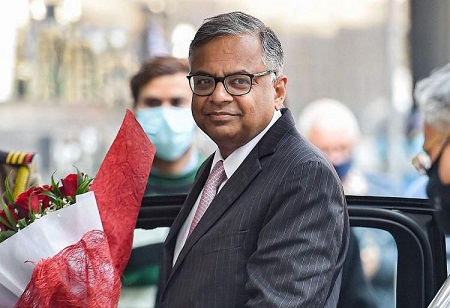
A strong panel of industry leaders leading the AI charge gathered for a session on AI for Business and Societies at B20 Summit India 2023 in New Delhi on August 25th, to discuss the opportunities and challenges ahead. Other than deliberating on the regulatory aspect of AI, they spoke about how exciting Artificial Intelligence is, its implications, and how everyone should think about this technology.
During the discussion, N Chandrashekaran, Chair, B20 India and Executive Chairman of Tata Sons, India spoke about the AI opportunities and challenges. He stated that digital transformation has been a theme around the world for at least a decade. Now it is time to talk about AI transition. Following are the excerpts.
We will be looking at the AI transition from India's point of view. Everything discussed here would be applicable to all the developed and developing nations and certainly to the global south. If you look at the impact digital transformation has made in India, it is truly remarkable. In our country, we fundamentally have two problems, which is true for many of the global south countries as well and that is the lack of access. Hundreds of millions of people, an estimated 300 million people lack access to services such as healthcare, education, and some time ago for banking but not anymore. And, on the other hand, we have a lot of people looking for jobs. We have 10 million to 12 million people coming into the workforce every year and 100 million people coming into the workforce this decade. Therefore, you have to solve both problems. However, these cannot be solved by going around and creating hard infrastructures.
Significance of Technology Adoption
The first and most important factor is that we need a huge amount of money and more importantly a lot of time. Since we do not have the time to accomplish it, the only way to solve this problem is by adopting technology and adopting it at a pace and scale that has never been done before.
Delivering Public Services at a Remarkable Scale
Let us look at what has been accomplished in the last 10 years. India has put in a digital infrastructure that is so unique that we can deliver public services at a remarkable scale and with ease. In the India stack, firstly we have a unique identifier, the digital identifier for all citizens.
Digital Payment Systems
Secondly, we have a payment system, which has completely transformed the way we operate and the way we live. Not a single day goes without looking for a couple of OTPs. And, none of us carry cash in hand. Even a street vendor, selling coconut water has no time to accept cash in hand. Hence, this is the normal language in the country, today.
Creating Secure Infrastructure
The third element is we have been able to create a secure infrastructure where consent is given digitally on the fly for the transaction. This digital public infrastructure is what enables us to carry out big accomplishments at scale. The second point I want to take is the example of Covid. The way we could actuate people - the way we could build an app and track citizens all over the country - could not have been done without this infrastructure. Therefore, the opportunity to make an impact on AI is of a different scale now with generative AI because the world is already moving from predictive AI to generative AI.
Empowering employees
However, people today are worried about privacy and think that they will lose their jobs. In a country like ours, AI will create jobs because it will empower people with little skill or no skills. It will empower them with information and skills so that they can perform a higher level of job. For instance, a nurse will be able to take away the workload of a doctor and that is the way we are going to scale up.
India has made a big breakthrough in this privacy space. India has taken a techno-legal approach. On the one hand, we have the regulation for data privacy and data protection, on the other hand, we have created DEPA - Data Empowerment and Protection Architecture, both working together we are able to very safely secure with the consent of any transaction and sharing of data at an aggregate level with complete security protecting privacy.
The future is very strong and we have to figure out a way of embracing AI in such a way that we can innovate faster at the same time protect privacy.
We use cookies to ensure you get the best experience on our website. Read more...